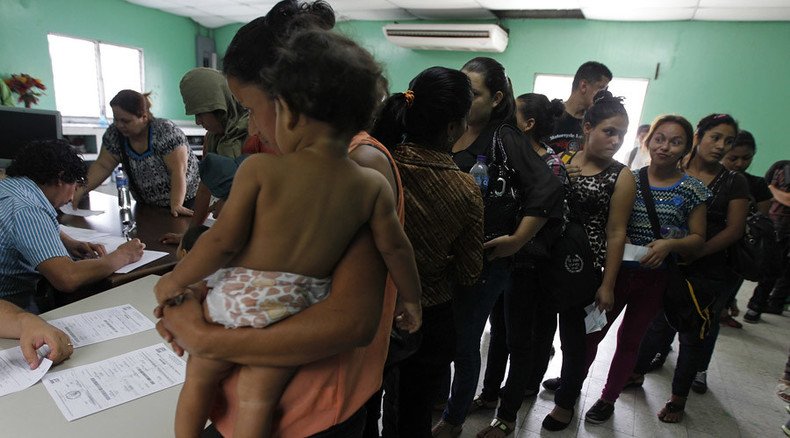'They treat us like dogs': 27 women detained in Texas immigration center begin hunger strike

Nearly 30 women at an immigration detention facility in Texas have begun a hunger strike. In their letters, made public by a civil rights group, they highlight “grave injustices,” detentions of up to 18 months, inedible food, and “little or no security.”
“There are grave injustices being committed, detentions spanning eight months, 10 months, a year, a year and a half, so in the end we are being told we have no rights and will be deported, with offensive words and gestures that make us feel worthless,” Magdrola, from Guatemala, wrote in her letter, published by Grassroots Leadership along with 16 letters from other detainees.
According to the rights group, at least 27 women are hunger striking at the T Don Hutto residential center in Taylor, near Austin, asking for immediate release.
BREAKING: At least 27 women on hunger strike at the Hutto Detention Center #Hutto27https://t.co/40lkJeETFS#not1more
— GrassrootsLeadership (@Grassroots_News) October 28, 2015"It gives me great pleasure to participate in this hunger strike. I can't take any more of this punishment. I'm dying of desperation, from this injustice, from this cruelty,” Insis from Honduras wrote. “They treat us like dogs... When I feel bad, they say I'm lying..."
@Grassroots_News#immconf Asylum seeking woman at Hutto "I came seeking help, instead I am punished...they treat us like dogs" #Hutto27
— Michelle Brane (@MichelleBrane) October 29, 2015Some of the detainees say they will be in great danger if they are deported to Central America.

"I am a woman fleeing a country where women are given few rights, all of which are violated, and land in this place where the people of immigration condemn us to a process with little or no security, since this process will ultimately end with our deportation. With no objection to a lack of defense, condemning us to an assured death upon being deported back to our countries, then where are our rights?" one of the women wrote.
Thousands of women, some with children, flee their homes in Central America and Mexico each year to escape armed gangs and domestic violence. Nearly two-thirds say threats and attacks by armed criminal gangs, including rape, killings, forced recruitment of their children and extortion payments, were among the main reasons they left their home countries.
Over 66,000 children traveled with their families or alone from the Northern Triangle region of El Salvador, Honduras and Guatemala – which has the world’s highest murder rates – to the US in 2014 alone, the UNHCR said in a report published on Wednesday.
There’s a looming refugee crisis in Central America. Read more: https://t.co/FQ0iuHAMcl#WomenOnTheRunpic.twitter.com/AD2fZNNl2s
— UN Refugee Agency (@Refugees) October 29, 2015The UN Agency said it had recorded a nearly five-fold increase in asylum seekers arriving in the US from the Northern Triangle since 2008.
READ MORE: ‘Dehydrated & scared’: Illegal migrants rescued from sweltering truck in Texas (VIDEO)
Inadequate legal representation appears to be the most common concern.
“While fighting the case they leave us in here only to tell that it has been denied in the end, and after making us wait for a long time they send us back. The food they give us here is very bad, and gives us stomach problems. Please, enhance our rights,” Patricia, from El Salvador, wrote.
Elda, a Guatemalan, says she has been detained since last December and that she will be deported. Her case was eventually denied even though her two daughters were born in the US.
“They are so sad, they need me,” she wrote.
A US Immigration and Customs Enforcement spokeswoman said in a statement, cited by the Guardian, that the agency is not aware of any strike: “ICE takes the health, safety, and welfare of those in our care very seriously and we continue to monitor the situation. Currently, no one at the T Don Hutto Detention Center was identified as being on a hunger strike or refusing to eat.”
In mid-October, over 50 South Asian detainees from Bangladesh, Pakistan, and Afghanistan, kept at the El Paso facility in Texas, also went on hunger strike that lasted 7 days. They demanded an end to deportations and an investigation into allegations of mistreatment and medical neglect.












